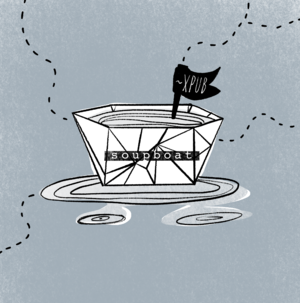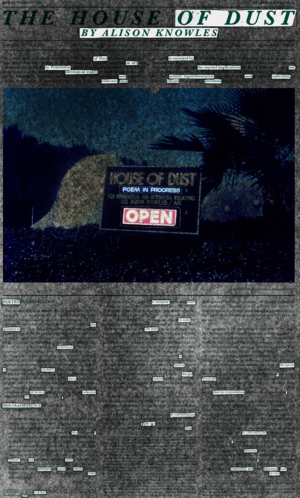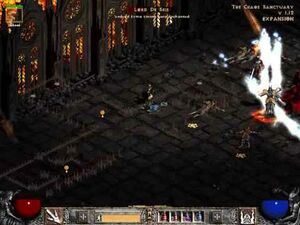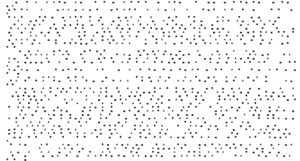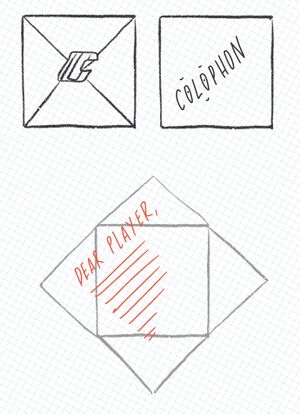User:Ålnik: Difference between revisions
| Line 76: | Line 76: | ||
[https://pzwiki.wdka.nl/mediadesign/%E2%98%BE_%C3%85l_Nik_%E2%98%BE My reflections on the process of creating our first Special Issue.] | [https://pzwiki.wdka.nl/mediadesign/%E2%98%BE_%C3%85l_Nik_%E2%98%BE My reflections on the process of creating our first Special Issue.] | ||
[[Special Issue #17: Productive Play]] | |||
With our second issue and the seventeenth one for XPUB, we dived into the topic of "productive play", led by artist and researcher Lídia Pereira. During the reading sessions, we have elaborated on gamification, video games, monetisation mechanics and all of those's impacts on our work & personal life. In order to reflect on the topic, we formed reading groups and made discussions in class. Here are all of the (mini)projects I was part of during this special issue. | |||
==== Glossary ==== | ==== Glossary ==== | ||
[https://pzwiki.wdka.nl/mediadesign/Glossary_of_productive_play All the terms connected to the topic, researched & defined by us all.] | [https://pzwiki.wdka.nl/mediadesign/Glossary_of_productive_play All the terms connected to the topic, researched & defined by us all.] | ||
Revision as of 14:53, 21 March 2022
Hello, world! Ål here.
About
Digitart, illustration, visual facilitation & scribing, graphic design. Looking for experimenting with tools, researching peculiar topics and finding focus before the end of XPUB2. ;)
XPUB1
Special Issue #16: Vernacular languages processing
Vernacular language processing methods
00. Mix of Sauces
Reader prototyping project developed in class by Kamo, Supisara & me. We tried the method of taking a complex text and simplifying by putting it in chat bubbles. Find out more here.
01. Blackout (poetry)
def Blackout poetry (when a page of text is completely blacked out (coloured over with permanent marker so that it is no longer visible) except for a select few words. When only these words are visible, a brand new story is created from the existing text.)
Blackout (poetry) is an intervention in someone else's work to create new meanings, express new ideas, find new directions. It can also be a way to annotate and focus on the big picture. Or not?
Example: Blackout poem from the first page of the "House of dust" journal, see here. There are at least two ways to read the annotated result - 1 here and 2 here.
02. Repetition and new meanings
By printing a short sentence a hundred times, repeating itself, we can discover a new meaning. We can start from a different word every time and construct several meanings. Pretty simple, but fun to try. Example: Welcome to the World of Bees
03. Petition comments processing
Experimenting with my first steps in processing natural language with Python. For this exercise I took a petition tackling the housing crisis in the Netherlands and the comments of people who signed it. In order to get to know their stories, real problems and reasons for participation, I copied their comments in a pad and then ran a function to extract the adjectives - the words they used to describe the situation or their feelings. See the petition comments pad here and the pad with the extracted adjectives. Here is the processing code.
Challenges not solved: we see the adjectives out of context; you don't see when an adjective had also a negative "no/not" before it. How do you get what was the sense behind the adjective when filtering them like this? What can you do with this output?
04. Rejection as a self-care
Together with Miriam, we elaborated on the idea of looking at the rejection as a self-care mechanism. Here are our concept and brainstorming.
05. Final project: Annotation Compass
As part of our "Learning How To Walk While Catwalking" themed special issue, together with Kamo, Jian, Kim, Supi and Emma, we created and explored the "Annotation Compass": a tool for gathering situated impressions in order to create individual, vernacular and poetic readings of various inputs (such as space, image, text).
Rotterdam Impressions
These illustrated subjective maps represent the impressions of the first year master students of Experimental Publishing at the Piet Zwart Institute. Their situated experiences trigger various ways to describe their new home: Rotterdam. They were invited to reflect on the way they remember some of the areas in the city and to describe how they feel about them. In words, in their own vernacular English - the common language that is not native to anyone of them but the main language they communicate between each other. Afterwards, their descriptions were filtered by a Python function to extract the most common words they used whilst describing their perceptions of the selected areas on the map, divided in three main categories - adjectives, nouns and pronouns. The final outcome is this short list of the most common impressions of various places and illustrated maps as an artistic expression of the author. Discover my showcase of the "Annotation Compass" here. See my whole journey here.
Research
What is vernacular language? Before, now, tomorrow. When was the first time anyone came with the concept of vernacular? How can it be processed? What interventions can be done and why?
In the world of abstract, whilst trying to orientate myself, I am looking for familiar things and starting points. A little side-gig exploration on my own is available here and here.
Prototyping
Embracing on a journey to play with programming and create stuff whilst doing that.
First trimester:
- Functions Library (a collection of functions to have in handy)
- Week 01 - first steps in Phyton (XP 4, 5 & 6)
- Week 02 - processing language & more experiments (XP 7, NL 1)
- Week 03 - nltk, first baby steps to do our own functions (NL 2, XP8 hopefully...)
- Week 04 - XP, NL
- Weeks 05-06 - hello, corpora
- Week 07 - catching up with XP and counting
- Week 08 - using Python for processing input on etherpad
- Week 09 - using Python to create html file, enhance with css
- Week 10 - flask, forms, more experiments with rotterdam impressions idea
Reflection
My reflections on the process of creating our first Special Issue.
Special Issue #17: Productive Play With our second issue and the seventeenth one for XPUB, we dived into the topic of "productive play", led by artist and researcher Lídia Pereira. During the reading sessions, we have elaborated on gamification, video games, monetisation mechanics and all of those's impacts on our work & personal life. In order to reflect on the topic, we formed reading groups and made discussions in class. Here are all of the (mini)projects I was part of during this special issue.
Glossary
All the terms connected to the topic, researched & defined by us all.
Reading list
Reads for the trimester with notes and annotations.
Research
Weekly
- week 01 [introduction]
- week 02 [ideology, gamification]
- week 03 [monetization mechanics, further reading, karaoke]
monetisation models & reads; predatory monetisation mechanics map with Kamo and Erica
karaoke group reading (monday & wednesday)
typography class (monday, wednesday & friday) at the Publication station
SI16 reflection with (almost) the whole group: https://pad.xpub.nl/p/si16_debrief
- week 04 [digesting, tutorials, glossary]
digesting, reflecting, more reads
individual tutorials
creating a glossary for productive games
- week 05 [prototyping: puzzles, mazes, human computing; editorial: modding; fan-fiction]
building little games, playful things, make mazes with python
what is modding and how it is connected to culture and labour
kim & chae's experimental kitchen session - to try different roles within the group and new decision taking approach
- week 06 [playing games made by us; git pushing mess]
collaboration tools and git play our little games (connectless was tested with Jian, Chae and Supi) clarifying the elements of the loot box
- weeks 07 & 08 [spring break]
group meeting discussing prototypes and (dis)agreeing on the SI form & content
prototype of a concept for the loot box content
the group being stuck on decision-taking and therefore made a group division
writing workshop at the Research station
- week 09 [prototyping with Manetta, small groups meetings with Lidia, ediorial meeting & FIBER lab]
bots, IRC [hello, again, mIRC-a :D] & chat bots with python [we were banned hehe]
took part in all of the meetings with Lidia and the teams in order to make a summary and support the editorial decision-taking; pad of the day with my notes
editorial meeting preparation
editorial meeting with Gersande, Chae, Emma and Erica
FIBER lab "Natural Intelligence" in A LAB, Amsterdam: my pad, varia's pads, tools brainstorming pad
Projects & research work
00. Karaoke (reading) group [w/ Chae, Kamo, Mitsa & Erica]
[Karaoke] is a playful format (a game?) that makes the player follow the lyrics and play along. While you are singing the song you get to spend some time with the lyrics as well - some pay attention to them, others are more concentrating on keeping up with the tempo. However, you definitely pay more attention to them than when simply listening to the song.
[Rewriting symbolic song] The process started with reflecting on the readings as a group and putting in place key phrases that stuck with us. Things we wanted to bring up when we were writing the new lines. While rewriting someone else's lyrics, we were following the number of syllabises in order to keep the rhythm. And only after that, we managed to work on matching the rhymes. The lyrics were edited several times, re-written and supplemented by Chae and Mitsa. Chae and I finalised them to meet the deadline for sending the contents for printing.
Our karaoke was part of the publication.
01. Game analysis: Diablo II Lord of Destruction [individual work]
I played this game a lot when I was a teenager. My favourite moments were collecting rare items (armoury, charms, weapons) for my character and enhancing her skills and strength. I used to spend extra time on walking around to reveal the whole map of each world, thus I was always trying to make my character being able to run faster. I was even repeating some levels in order to make her stronger before going to the next Act.
[Ideology analysis] was a curious process to get back to something familiar from another life and look at it from another point of view. Here are some observations about the game design and gameplay.
02. Connect-less [individual work, prototype played by Supi, Chae & Jian]
“Well, if you are a [well-connected] man, you will [network] from morning till night. When you [wake up], you [get outside], and when [you get there, you network - you meet people and you connect with them]. You do that right straight through the day. And what’s more, no back talk. Now a [well-connected] man does just what he’s told to do, and no back talk. Do you understand that?"
—rephrased Frederick Winslow Taylor, The Principles of Scientific Management (1911) [rephrased content is in square brackets]
—from"Selfwork", Karen Gregory; Kirsty Hendry; Jake Watts; Dave Young February 02, 2017
Networking is quite crucial for our work and success, isn't it? The better we are connected, the more opportunities we have. The more opportunities we get, the more chance we have to get work and gigs. Your success and wellbeing depends on how connected you are. The more, the merrier.
However, some might feel the pressure of constant networking and being out there. The fear of missing out. The opportunities never reached. All the anxiety that may bring.
In this silly exercise you and your partner will explore ways to connect to other well-connected creatures like you (either circles or squares). And to reflect on all of this in a simple conversation while doing some simple lines. However, you networks might collide. You must not cross any other connection (line) and find your way around them. You must connect as much as possible.
The game was part of the publication.
03. Flirting at School game fan-fiction [w/ Jian & Miriam]
We did not find common games, so we decided to write fan-fiction about the game Miriam brought to class - "Flirting at School". Whilst playing the game a little bit, we agreed that it is impossible to write anything about it since we found everything about its gameplay and storyline wrong. That is why we took the rules of the game and rewrote them.
04. Modding discussion [w/ Jian & Miriam]
[Group discussion] of Chapter 2:"Game Modding: Cross-Over Mutation and Unwelcome Gifts" from "The Player’s Power to Change the Game" by Anne-Marie Schleiner. The approach to look at modders as "parasites" and opportunists was quite new to us - this and other observations we discussed are written here.
05. Editorial Work [w/ Gersande]
[Facilitating editorial meeting & process] In order to help the groups (teams 1, 2 and 3) connect their ideas in a joint concept as well as exchange feedback and make editorial decisions, together with Gersande, we facilitated a meeting with the group representatives. To prepare, on the previous day, I took part in the small groups' meetings with Lidia, observed each group's key ideas and created summaries. Then, I extracted the main concepts and simplified them for the teams. During the editorial meeting we went through them and each group representative was invited to contribute by answering some important questions that were raised during the previous day. As a result of the meeting, we agreed on the main angle, setting, narrative and method. Pads: the preparation for the meeting + the notes from the small groups talks and the pad of the editorial meeting.
[Creating the editorial for the publication] Gersande and I discussed what should the format of the introduction to the publication be. We decided to make it as a letter written by the loot box. Then, Gersande made a draft following our structure to be short, concise and to have a paragraph of context, a paragraph about the box and another one about what the reader can do with it. On the next day, Steve and I edited it line by line - simplified and clarified it. We also did a copy edit of the contents on the publications; Gersande did proofing. A tidy pad with the editorial texts is here. I also made some meta tags for the website here.
06. Licenses [w/ Michael, Manetta & Aymeric's disertation]
While looking for the right license for the publication, in a conversation with Michael and Manetta, the need for an XPUB wiki page collection of useful licenses emerged. Thus, here is a starting point.
07. One sentence game ideas [whole group work]
Since the beginning of our work on the special issue, we started collecting game ideas in a minimalistic manner - in just one sentence. My contributions were often connected to a particular moment of our group work or joint experiences, in search of a common ground for the game idea and thinking of inside jokes.
- you receive a point for each moving/floating tile on the street you encounter
- a portal will take you on the opposite spot on the globe from the one you've picked up
- you are stuck in reality and you're trying to get back to your imaginary world but cannot find the door
- you get to experience your whole life in reverse
- the printer that works is hidden somewhere in a maze
The one sentence game ideas was also part of the final publication.
08. Event launch soundtrack [w/ Miriam & Kamo]
The playlist for the event has to be full of music from games, right? My contributions were the soundtracks of (#90skids vibes):
- The Neverhood (1996) [still one of the best games ever...]
- Grim Fandango (1998)
- Donkey Kong Country 2 (1995)
- Final Fantasy 6 (1994)

